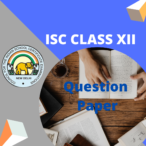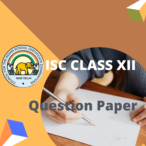ENGLISH PAPER-2
LITERATURE IN ENGLISH
SECTION A
THE TEMPEST ⎯ Shakespeare
![]() Q. 1 Choose two of the passages (a) to (c) and answer briefly the questions that follow:
Q. 1 Choose two of the passages (a) to (c) and answer briefly the questions that follow:
(a) Prospero :
This blue-eyed hag was hither brought with child,
And here was left by th’ sailors. Thou, my slave,
As thou report’s thyself, was then her servant,
And for thou wast a spirit too delicate
To act her earthy and abhorr’d commands,
Refusing her grand hests, she did confine thee,
By help of her more potent ministers
And in her most unmitigable rage,
Into a cloven pine…..
(i) What leads Prospero to talk about the ‘blue-eyed hag’?
(ii) Why was she brought to this island?
(iii) What account do we get of Ariel’s suffering in the cloven pine? Who had saved him and how?
(iv) How does Prospero describe the hag’s son?
(v) What does Prospero threaten to do to Ariel now? What effect does his threat have on Ariel?
(vi) Give the meanings of the following words in the context of the passage:
abhorr’d, cloven
(b) Caliban :
I prithee let me bring thee where crabs grow,
And I with my long nails will dig thee pig-nuts,
Show thee a jay’s nest, and instruct thee how
To snare the nimble marmoset. I’ll bring thee
To clustering filberts, and sometimes I’ll get thee
Young scamels from the rock. Wilt thou go with me?
(i) To whom is Caliban speaking these lines?
(ii) Briefly describe the circumstance under which he had met them.
(iii) Who does he think they are? Why?
(iv) To which other person had Caliban shown such a slavish attitude? What had the result been?
(v) How do his present listeners respond to his words?
(vi) Give the meanings of the following words as they are used in the context of the passage:
Snare, marmoset
(c) Ariel :Thy thoughts I cleave to. What’s thy pleasure?
Prospero : Spirit, we must prepare to meet with Caliban.
Ariel : Ay, my commander. When I presented Ceres
I thought to have told thee of it, but I fear’d
Lest I might anger thee.
Prospero : Say again, where didst thou leave these varlets?
(i) For whom is the term varlets being used?
(ii) What comical behaviour of theirs does Ariel narrate now?
(iii) Where had these people been going? Why?
(iv) Where did Ariel leave them eventually? What did they do then?
(v) What does Prospero tell Ariel to do? Why?
(vi) Give the meaning of the following words as they are used in the context of the passage:
cleave, varlets
CANDIDA ⎯ George Bernard Shaw
![]() Q. 2 Choose two of the passages (a) to (c) and answer briefly the questions which follow:
Q. 2 Choose two of the passages (a) to (c) and answer briefly the questions which follow:
(a) Morell : (thoughtfully) Hm! Time for him to take another look at Candida before she grows out of his knowledge. (He resigns himself to the inevitable, and goes out).
Lexy looks after him with beaming worship. Miss Garnett, not being able to shake Lexy, relieves her feelings by worrying the typewriter.
Lexy : What a good man! What a thorough loving soul he is! (He takes Morell’s place at the table, making himself very comfortable as he takes out a cigaret).
Proserpine : (impatiently, pulling the letter she has been working at off the typewriter and folding it) Oh, a man ought to be able to be fond of his wife without making a fool of himself about her.
Lexy : (shocked) Oh, Miss Prossy!
(i) Who is Morell talking about? How does he react when he gets to know about the arrival of this person?
(ii) What advice has Morell given Lexy about marriage?
(iii) What does Proserpine say further to express her displeasure?
(iv) When Lexy expresses unhappiness at Proserpine’s feelings against Candida, How does Prossy defend herself?
(v) Judging by Lexy’s disbelief, how does Proserpine condemn men’s ideas about women?
(vi) How does Lexy voice his regret then?
(b) Marchbanks :
(stopping her mysteriously) Hush! I go about in search of love; and I find it in unmeasured stores in the bosoms of others. But when I try to ask for it, this horrible shyness strangles me; and I stand dumb, or worse than dumb, saying meaningless things: foolish lies. And I see the affection I am longing for given to dogs and cats and pet birds, because they come and ask for it. (Almost whispering) It must be asked for: it is like a ghost: it cannot speak unless it is first spoken to. (At his usual pitch, but with deep melancholy) All the love in the world is longing to speak; only it dare not, because it is shy! shy! shy! That is the world’s tragedy. (With a deep sigh, he sits in the visitors’ chair and buries his face in his hands.)
Proserpine : (amazed, but keeping her wits about her: her point of honor in encounters with strange young men) Wicked people get over that shyness occasionally, don’t they?
(i) Where are Marchbanks and Proserpine?
(ii) How does Marchbanks offend Proserpine?
(iii) What are Marchbanks’ ideas of love?
(iv) What is ‘like a ghost’? Why has he used this reference?
(v) What does Marchbanks tell about his shyness to Proserpine?
(vi) Does Marchbanks agree with Proserpine when she says that wicked people do not feel shy?
(c) Marchbanks : [Convulsively]
Candida : Yes, onions. Not even Spanish ones: nasty little red onions. You shall help me to slice them.Come along.
[She catches him by the wrist and runs out, pulling him after her. Burgess rises in
consternation, and stands aghast on the hearth-rug, staring after them.]
Burgess : Candy didnt oughter andle a hearl’s nevvy like that. Its going too fur with it.
(i) Why is Marchbanks disgusted by the onions?
(ii) Why had he been similarly agitated a little earlier?
(iii) How had Candida responded then?
(iv) Why is Burgess shocked?
(v) What does he get to know about Marchbanks soon?
(vi) Why does Morell appear disinterested?
SECTION B
(Answer four questions on at least three textbooks which may include EITHER The Tempest OR Candida.)
THE TEMPEST ⎯ Shakespeare
![]() Q. 3 Referring closely to Act IV, scene i:
Q. 3 Referring closely to Act IV, scene i:
(a) Describe the blessings showered by Ceres and Iris on Miranda and Ferdinand.
What is the significance of these blessings?
(b) What did Prospero tell Ferdinand just before the masque? What did he emphasize and how did Ferdinand answer him?
(c) What do you conclude about Prospero from the events that occur in the act?
![]() Q. 4 Prospero refers to Caliban as “A devil, a born devil”. In this context, evaluate the character and role of Caliban in the play.
Q. 4 Prospero refers to Caliban as “A devil, a born devil”. In this context, evaluate the character and role of Caliban in the play.
CANDIDA ⎯ George Bernard Shaw
![]() Q. 5 Referring closely to Act III of the play Candida:
Q. 5 Referring closely to Act III of the play Candida:
(a) Describe the conflict between Marchbanks and Morell regarding Candida.
(b) Describe the auction that Candida initiates. Why do you think she terms it an auction?
(c) What is the reason for the choice made by her at the end of the play?
![]() Q. 6 In the play Candida, Shaw presents Candida as an unconventional woman. Discuss.
Q. 6 In the play Candida, Shaw presents Candida as an unconventional woman. Discuss.
THINGS FALL APART ⎯ Achebe
![]() Q. 7 Referring closely to the events, answer the following:
Q. 7 Referring closely to the events, answer the following:
(a) How is the Church established and what is the role of the white men in establishing it?
(b) Why does Nwoyi secretly become attracted to the religion of the missionaries? What was his father’s reaction?
(c) Which circumstances had led to the suicide of Okonkwo?
![]() Q. 8 How is the story about why mosquitoes buzz around people’s ears relevant to the novel?
Q. 8 How is the story about why mosquitoes buzz around people’s ears relevant to the novel?
![]() Q. 9 “His whole life was dominated by fear of failure and of weakness.” Do you think this is true of Okonkwo? Give your views with reference to the novel.
Q. 9 “His whole life was dominated by fear of failure and of weakness.” Do you think this is true of Okonkwo? Give your views with reference to the novel.
CONTEMPLATIONS
![]() Q. 10 Referring closely to the essay ‘My Visions of India’, answer the following:
Q. 10 Referring closely to the essay ‘My Visions of India’, answer the following:
(a) Relate the first and second vision of Dr. Kalam.
(b) What does he say about his third vision?
(c) How does Dr. Kalam co-relate his message with the message of J. F. Kennedy?
![]() Q. 11 Referring closely to the essay On being Idle, discuss how the writer treats a light subject with a serious message.
Q. 11 Referring closely to the essay On being Idle, discuss how the writer treats a light subject with a serious message.
![]() Q. 12 In the essay On the Decay of The Art of Lying, what makes Mark Twain argue that “the Lie, as a Virtue, A Principle, is eternal”? According to Mark Twain, what is a silent lie? What example does he give to demonstrate a silent lie? Why does he oppose injurious truth and injurious lying?
Q. 12 In the essay On the Decay of The Art of Lying, what makes Mark Twain argue that “the Lie, as a Virtue, A Principle, is eternal”? According to Mark Twain, what is a silent lie? What example does he give to demonstrate a silent lie? Why does he oppose injurious truth and injurious lying?
ECHOES
![]() Q. 13 Referring closely to the short story B. Wordsworth:
Q. 13 Referring closely to the short story B. Wordsworth:
(a) Describe the interaction between B. Wordsworth and the young narrator.
(b) What did the narrator learn from his friend?
(c) Do you feel that B. Wordsworth was an escapist? Give reasons for your answer.
![]() Q. 14 How does Roald Dahl depict the theme of obsession in his short story, The Sound Machine?
Q. 14 How does Roald Dahl depict the theme of obsession in his short story, The Sound Machine?
![]() Q. 15 How successful was the writer in bringing out the protagonist’s innate goodness in the short story, Salvatore?
Q. 15 How successful was the writer in bringing out the protagonist’s innate goodness in the short story, Salvatore?
REVERIE
![]() Q. 16 Referring closely to the poem Dover Beach:
Q. 16 Referring closely to the poem Dover Beach:
(a) Describe the moonlit scene described by the poet at the beginning of the poem.
(b) How does the poet introduce the note of melancholy and disturbance? In this context, what does he say about Faith?
(c) What does the poet say about the world in which he finds himself? What is the only hope left for mankind?
![]() Q. 17 How is the power of the Music Makers brought out in We are the Music Makers?
Q. 17 How is the power of the Music Makers brought out in We are the Music Makers?
![]() Q. 18 The poem John Brown presents two attitudes to war. Describe the two attitudes. Which one do you sympathise with? Why?
Q. 18 The poem John Brown presents two attitudes to war. Describe the two attitudes. Which one do you sympathise with? Why?



